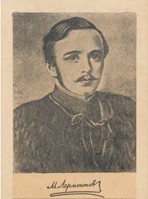
Existential loneliness and creative eternity: the Presidential Library explores Lermontov’s personality and creativity in the rarities
Shortly beore July 27 - a day of the memory of Lermontov (1814-1841) - the Presidential Library fund was replenished with new editions dedicated to the life and work of one of the most sacred and imperfectly understood Russian poets. Among them, the study of A. P. Georgievsky of 1914 entitled Lermontov about the purpose and meaning of life, the 1939-year’s book of I. L. Andronikov Life of Lermontov, the biographical essay of M. F. Nikolaeva M. Lermontov and other rarities. They have become an adornment of the collection, dedicated to the 200th anniversary of the poet, which an entire reading world celebrated in 2014. The collection includes books and periodicals with the texts of Lermontov's works, the studies of his life and work, as well as the postcards and photographs depicting the monuments to the poet and the places associated with his name.
Of particular interest is the book of a literary critic and an essayist N. A. Kotlyarevsky M. U. Lermontov, published in 1891, the year of the fiftieth anniversary of the poet's death, and went through five editions by 1915. “Of all the people, standing in the forefront of society, no one is so unarmed before the ethics of life, as a poet, that renowned pat of nature, - cleverly notes the author. - More than anyone else he has to suffer from the constant dissonance of the ideal and the reality.”
The origins of noticed by Kotlyarevsky “sadness, often passing into the form of darkness and dreary pessimism” M. F. Nikolaeva explores in her biographical essay “M. Lermontov,” based on excerpts from the unfinished novella of Lermontov, undoubtedly of autobiographical character: “In his six, he was already lost in admiration for the sunset. Sasha was pampered, self-willed child. God knows, what direction his character would take, if it doesn’t come to the aid of measles… The disease had important consequences on a mind and a character of Sasha: he learned to think. Imagination became a new toy for him.”
Happy and playful Mikhail Lermontov was only until a time when unfaithfully early his mother has passed away. The dominating grandmother Elizaveta Alekseyevna Arsenyeva, infinitely fond of her grandson, has done everything to eliminate him from his father's life, which she considered guilty in her daughter's death and misery. Later, the poet dedicated to his father the following lines: “You gave me life, but pleasure was not given; / Thyself was driven, / But understood by one.”
Lermontov himself was often not understood even by one - he was so disgusted of secular environment, which he described later in his poems and prose. Largely for this reason he interrupted his studies at Moscow University and entered the Petersburg School of Guard Warrant Officers, became a cornet of the Life Guards Hussar Regiment. In literary circles Lermontov maintains relationships with V. A. Zhukovsky, P. A. Vyazemsky, V. F. Odoevsky, A. I. Turgenev, A. N. Muravyov, Count Sollogub and especially with A. A. Krajewsky, who started (since 1839) releasing “Otechestvennye Zapiski” (literary, the native notes), where Mikhail Yuryevich soon became one of the most active employees and where the two passages of “A Hero of Our Time” were published.
“Pechorin is a relative of the Demon, Arbenin, Radin, Ishmael and the final completion of the latters. Total disappointment in everything… passionate nature, spontaneously condemned itself to idleness, willfully discard the fundamental questions of life, given to all counter-flows at once,” - writes A. P. Georgievsky in his 1914-year’s study Lermontov about the purpose and meaning of life.
"Many Russian poets spoke of their contempt for the “crowd”, but none among lyricist was bringing himself entirely to identification of all the immeasurable tragedy of this unequal struggle,” - could be read in the electronic copy of I. L. Andronikov’s book Life of Lermontov of 1939.
Written on the death of Pushkin poem has pointed an entire Russia on his real successor. “There is a widespread belief - Andronikov wrote - that innovative in its substance and form piece is beyond a perception of contemporaries, and only the future can properly appraise it. The “Death of the Poet” does not agree with this concept. Lermontov did not have to wait for the approval of future generation. Contemporaries, feeling equal sorrow for Pushkin, highly acclaimed these lines in the same days, when a poem began to spread around the city.”
Already in a few days the lines from the “Death of the Poet” enter an everyday speech, the poem is being rewritten by hand and sent from St. Petersburg to the other cities and places. The consequence of this was an exile the author of censored lines to the Caucasus. “Researchers do not have reason to believe that Lermontov’s transfer to the Caucasus in the Nizhny Novgorod Dragoon Regiment was a strict repression - continues his research Andronikov. - But we have every reason to see in the story with the poetry on Pushkin's death besides a beginning of Lermontov's poetic fame, a beginning of his end.”
A payoff from a society, which, in the words of Lermontov, “remains for me a gathering of people unfeeling, extremely selfish and full of envy to those in whose souls a tiniest little spark of heavenly light is saved,” was not long in coming.
Not the slightest spark of divine presence was in the soul of Nikolai Martynov, who had killed the poet in a duel at the foot of Mashuk Mountain in Pyatigorsk and threw him to die alone. Major Martynov, who shot much worse as served in the Caucasus cornet of unprecedented courage, did not miss his aim this time…

